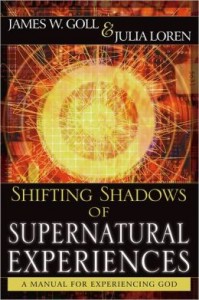Shifting Shadows of Supernatural Experiences: A Manual for Experiencing God
 James W. Goll and Julia Loren, Shifting Shadows of Supernatural Experiences: A Manual for Experiencing God (Shippensburg: Destiny Image, 2007), 244 pages, ISBN 9780768424973.
James W. Goll and Julia Loren, Shifting Shadows of Supernatural Experiences: A Manual for Experiencing God (Shippensburg: Destiny Image, 2007), 244 pages, ISBN 9780768424973.
James W. Goll and Julia Loren did not simply write another book on supernatural experiences. Emerging out of their own lives and academic study, this book has been written for those who want to know more about the different kinds of supernatural experiences they can encounter. James and Julia believe that anyone who seeks God can meet him in powerful and tangible ways.
It is essential to read any book which deals with supernatural phenomena with appropriate skepticism and discernment. At the same time, we need to remain humble and open minded to see how we can experience God’s gifts and presence in our lives. This book implies that every believer can have supernatural experiences like visions, trances, even out-of-body experiences. But is this true? Or are these experiences only for certain believers?
The authors seek to answer many questions about spiritual experiences. What are the types of spiritual experiences that are common to humankind? How can you tell if an experience comes from the Holy Spirit or from somewhere else? What is a figment of our imagination? What arises from our minds and psychological or emotional states? Or what, perhaps, may originated in the demonic realm? What do you do with those experiences? (15). For the most part, the writers have answered these questions. However, discussing the interaction of the demonic within the realm of supernatural experiences—it is mentioned only a few times throughout the book—seems incomplete.
This book can serve as a starting point to develop an experiential theology. From this book one can learn how to articulate personal supernatural experiences and compare them with biblical examples. This book clearly deals with pneumatological (study of the Holy Spirit), and ecclesiastical (church) issues. One example is the recognition that the church is a pneumatic community, and that we should test supernatural experiences in a communal setting. As Jim Goll states, “In a world of imperfect people, God-given revelation can be mixed with competing information from sources that are not from God. People functioning as prophetic mouthpieces or visionaries are imperfect instruments, though vital to the Church today” (218). This underscores the need to develop a process of communal discernment that allows the Spirit of God to validate or disregard supernatural encounters.
This fascinating book will inspire, confirm and uplift those who are interested in learning about supernatural experiences given by the Holy Spirit. Some readers may find accounts similar to their own experiences, and others may be introduced to personal encounters with the Holy Spirit unlike anything they have known before. Although one has to be careful not to generalize supernatural experiences, this book can serve as a tool to develop a theology of supernatural experiences. It was thought provoking yet spiritual, indicating that God has much in store for us.
Reviewed by Rony Reyes
Category: Spirit, Summer 2008


